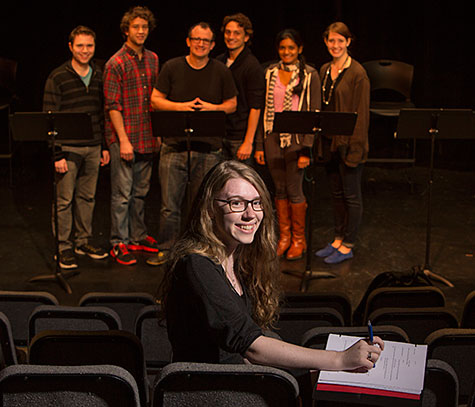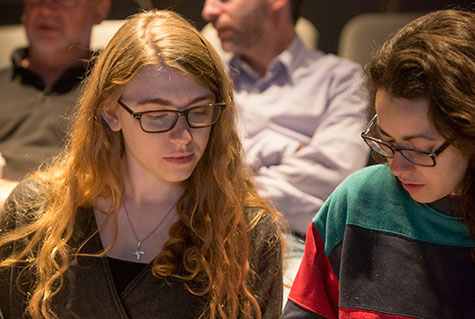
This week, Kristen O’Neal, a senior in English in Arts & Sciences at Washington University in St. Louis, will present a staged reading of “Kairos,” her first full-length play, as part of the annual A.E. Hotchner New Play Festival.
Sponsored by the Performing Arts Department in Arts & Sciences, the festival is named for alumnus A.E. Hotchner, who famously bested Tennessee Williams in a campus playwriting competition. Also debuting this year will be “Ekphasia, or ‘The Shadow Girl’ ” by Cary Simowitz, a second-year student in the School of Law; and “Telegraph” by alumnus Will Jacobs (LA ’14).
O’Neal discusses “Kairos,” the playwriting process and what it’s like to finally hear the words out loud:
You’re a senior majoring in English. Is this your first time writing for the stage?
I’d written a few shorter things — I remember putting on plays with my brother and cousin when we were little — but never a full-length work. I had to ask my friends how to format the script! But being at Wash U has definitely encouraged me. I went to a handful of Thyrsus’ monthly “No Shame” theaters and, when I saw the Hotchner posters freshman and sophomore year, I thought, “I want to do that.”
Tell us about “Kairos.” What’s the story of the play? What inspired you to write it?
Oh man. I’ve described it in rehearsal as a modern, time-traveling “Our Town.” Basically, five people find themselves in the same train station, talking to one another from different points in time.
I was inspired by the concept of kairos. In Greek, there are two words for time: chronos, which refers to chronological passage, and kairos, which refers to events. It means the “opportune time” or “divine time.”
So we catch these characters at moments that are really important to the courses of their lives. But at its core, Kairos is about human interaction. It’s about relationships.

How does writing drama differ from writing prose?
I write a lot of fiction, and often talk through stories with other people, but when it comes down to it, the act of writing is pretty solitary. It’s up to the reader to imagine what you’ve written.
Drama is more communal, which is really special and fun. It’s incredible to see your characters come alive in front of you. Everyone working on this has just been wonderful.
How do you feel about the upcoming readings? Nervous? Looking forward to it?
Definitely both. When it comes to making your play better, there’s nothing more helpful than hearing actors read it out loud and getting feedback from an audience. I’m realizing that there are still a lot of edits to make, but I’m excited to work through them — and I’m so lucky to have this team to help me.
About the Hotchner Festival
The A.E. Hotchner New Play Festival begins at 7 p.m. Friday, Sept. 19, with “Ekphasia, or ‘The Shadow Girl,’ ” written by Simowitz and directed by Henry I. Schvey, professor of drama in Arts & Sciences.
O’Neal’s “Kairos” — directed by Pannill Camp, assistant professor of drama — begins at 2 p.m. Saturday, Sept. 20. The series concludes at 7 p.m. that evening with “Telegraph,” written by Jacobs and directed by Andrea Urice, senior lecturer in drama. (The latter also will be produced as part of the PAD season next April 16-19.)
The festival is coordinated by Carter W. Lewis, playwright-in-residence.
Dramaturg is Ed Sobel, director of new play development at Steppenwollf Theatre in Chicago.
All readings are free and open to the public, and take place in The A.E. Hotchner Studio Theatre, located in Mallinckrodt Center, 6445 Forsyth Blvd. For more information, call 314-935-5858, visit pad.artsci.wustl.edu or follow us on Facebook.